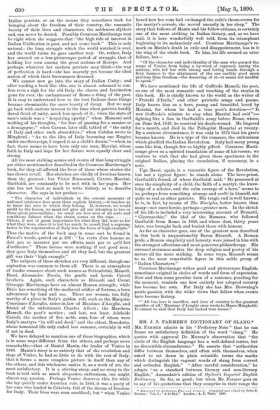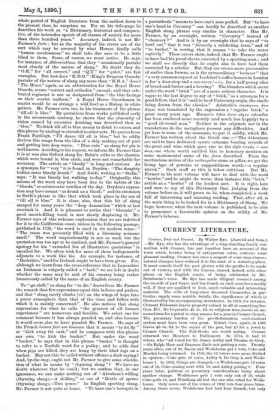MR. J. S. FARMER'S DICTIONARY OF SLANG.* MR. FARMER admits
in his " Prefatory Note " that he can frame no satisfactory definition of the word "slang." He quotes with approval Dr. Murray's observation that "the circle of the English language has a well-defined centre, but no discernible circumference." He asserts that "authorities differ between themselves, and often with themselves, when asked to set down in plain scientific terms the marks which distinguish the vagrant words of slang from correct and orthodox English." "After careful consideration," he adopts " as a standard between literary and non-literary English," Annandale's edition of Ogilvie's Imperial English Dictionary. So far, so good ; but when Mr. Farmer goes on to say of his quotations that they comprise in their range the * Slang and its Analogues, Past and Pfesent. Compiled and edited by John S. Farmer. Vol. I , " A to Bp.." London: A. P. Watt. 1890. whole period of English literature from the earliest down to the present time, he surprises us. For on his title-page- he describes his work as "a Dictionary, historical and compara- tive, of the heterodox speech of all classes of society for more than three hundred years." Accuracy, indeed, is not Mr. Farmer's forte ; but as the majority of his errors are of the sort which may be covered by what Horace kindly calls "human carelessness," we shall take due care to be a little blind to them. Some, of course, we must notice. He says, for instance, of Abbreviations, that they " occasionally partake most clearly of the nature of slang." No doubt they do. " O.K." for " all correct," and " Q.T." for "quiet," are fair examples. But how does " K.D.G." (King's Dragoon Guards) partake of the nature of slang any more than " R.H.A." does P "The Blues," again, as an abbreviation for the Royal Horse Guards, seems "correct and orthodox" enough, and that cele- brated regiment is not so designated from " the blue facings on their scarlet uniform." A Royal Horse Guardsman in scarlet would be as strange a wild fowl as a Bishop in white gaiters. Mr. Farmer errs, too, in his treatment of the phrase "till all is blue." By quotations from works published early in the seventeenth century, he shows that the obscurity of vision caused by excessive drinking was described then as .`blue." To drink till all is blue means to drink to excess, and this phrase by analogy is extended to other acts. He quotes from Frank Fairleigh, " I'll dance till all is blue," but he oddly derives this usage from the idea of a ship making out of port and getting into deep water. " Blue ruin " as slang for gin is well known. Acceding to his request, we inform Mr. Farmer that it is or was also Oxford slang for Bohn's cribs to the classics, which were bound in blue cloth, and were not remarkable for accuracy. The article on " bloody " is long and curious. As a synonym for " very " it is found in Dryden : " The doughty bullies enter bloody drunk." And Swift, writing to " Stella," says : " It was bloody hot walking to-day." Originally, this misuse of the word may have been due to the habits of the " bloods," or aristocratic rowdies of the day. Dryden's expres- sion may have meant " as drunk as a blood;" and its extension in Swift's phrase is like that which took place in the use of " till all is blue." It is clear, also, that this bit of slang escaped for many years the "deep damnation" which at last overtook it. And it is pleasant to notice that " bloomin'," a good mouth-filling word, is now slowly displacing it. Mr. Farmer says of this welcome euphemism that we are indebted for it to the Californian coast, unless in the following passage, published in 1726, " the word is used in its modern sense : " " The room was presently filled with a blooming noisome smell." The word unquestionably is not so used, but the quotation was too apt to be omitted, and Mr. Farmer's general apology for his " extended list of illustrative quotations " is uncalled for. We often wish for more of these indispensable adjuncts to a work like his. An example, for instance, of " Barkshire," used for Ireland, ought to have been given. For, although we learn from the cross-reference that in Lancashire an Irishman is vulgarly called a " bark," we are left in doubt whether the same may be said of his country being rather humorously called by the name of an English county.
To " go aloft," as slang for "to die," draws from Mr. Farmer the remark that few expressions equal this in force and pathos, and that " slang rarely climbs [Biel on the wings of hope into a purer atmosphere than that of the vices and follies with which it is mainly concerned.". He also notices that slang expressions for what he calls " the greatest of all human experiences" are numerous and forcible. We select one for comment because it has always puzzled us, and also because it would seem also to have puzzled Mr. Farmer. He says of the French laisser fuir son tonneau that it means " to let fly " or "kick away the cask," and he compares with this phrase our own "to kick the bucket." But under the word "bucket," he says that in this phrase "bucket" is thought to refer to a Norfolk word for a pulley; and he adds that when pigs are killed, they are hung by their hind legs on a bucket. May not this be called without offence a dark saying P And, by-the-way, ought not Mr. Farmer to give some elucida- tion of what he means by " rhyming slang " We have no doubt whatever that he could ; but we confess that, in our ignorance, we can make nothing out of " Abraham's willing (rhyming slang),—A shilling," or out of " Bottle of spruce (rhyming slang),—Two pence." In English sporting slang, Mr. Farmer is not quite at home. " To have one's bowsprit in a parenthesis " means to have one's nose pulled. But " to have one's head in Coventry" can hardly be described as another English slang phrase very similar in character. Has Mr. Farmer, by an oversight, written " Coventry " instead of " chancery ? " And is it by an oversight that he says of " to bowl out," that it was "formerly a cricketing term," and of " to bucket," in rowing, that it means " to take the water unfairly." These errors show, indeed, that Mr. Farmer ought to have had his proof-sheets corrected by a sporting-man ; and we shall see directly that he ought also to have had them corrected by a scholar. But they are errors more provocative of smiles than frowns, as is the extraordinary " bouncer" that " a very common request at Lockhart's coffee-houses in London is for 'a door-step and a sea-rover,'—i.e., for a half-penny slice of bread-and-butter and a herring." The blunders which occur under the word " brick " are of a more serious character. It is vague to the last degree to say of " brick," as a synonym for a good fellow, that it is " said to be of University origin, the simile being drawn from the classics." Aristotle's rerpciyorog drew poyou was translated by the expression a " regular brick," a great many years ago. Horace's taus teres atque rotund= has been rendered more recently (and much less happily) by a " good all-round man." Neither in the originals nor in the translations do the metaphors present any difficulties. And yet here is some of the nonsense, to put it mildly, which Mr. Farmer has written about the Greek one :—" The Athenians are said to have dedicated square columns bearing records of the great and wise, which gave rise to the style a-rrpci.y = ass; oimnp, one whose worth entitled him to honorary mention on some monumental stone of the form described. From the meritorious notion of the rectangular stone or pillar, we get the living type of genuine or supposititious worth,—a regular BRICK." Such stuff as this is below criticism. But Mr. Farmer in his next volume will have to deal with the word " howler," and he might do worse than instance this "brick " article as a " howler " of the loudest sort. It is right, here and now, to say of this Dictionary that, judging from the volume before us, it will prove to be, when completed, a work full of interesting and amusing reading. That, after all, is the main thing to be looked for in a Dictionary of Slang. We hope, however, when the next volume is published, to be able to pronounce a favourable opinion on the utility of Mr. Farmer's labours.







































 Previous page
Previous page